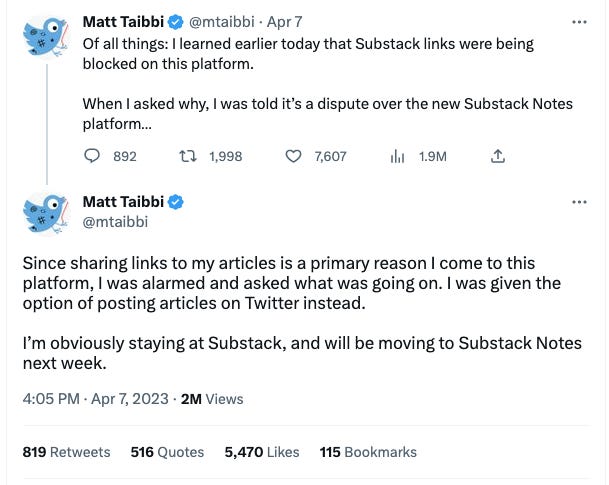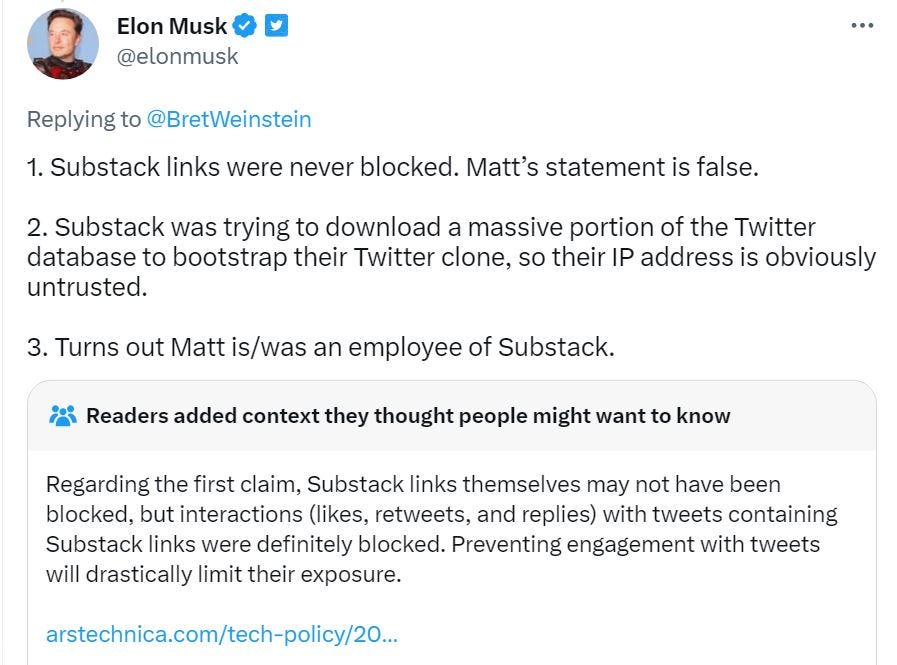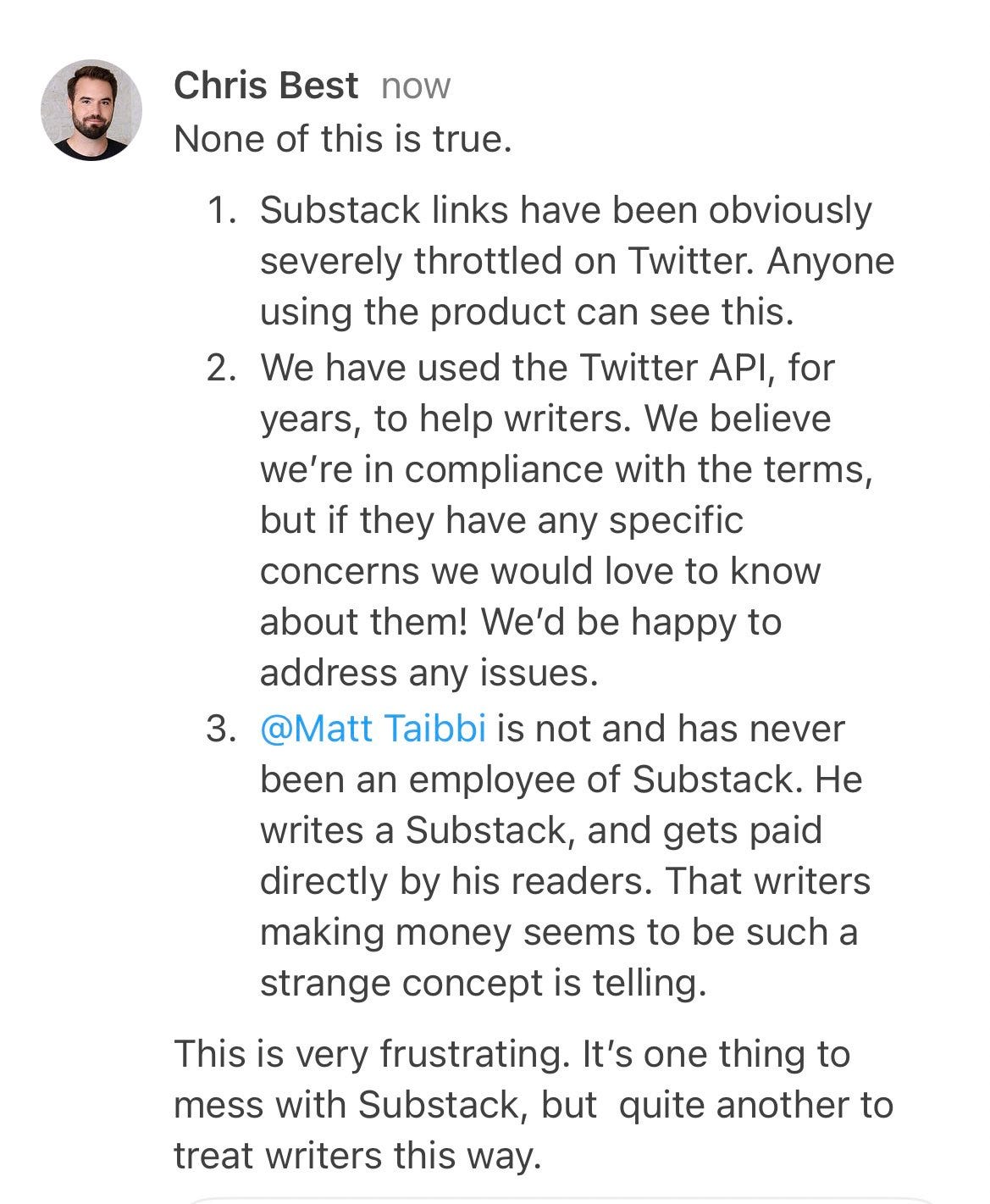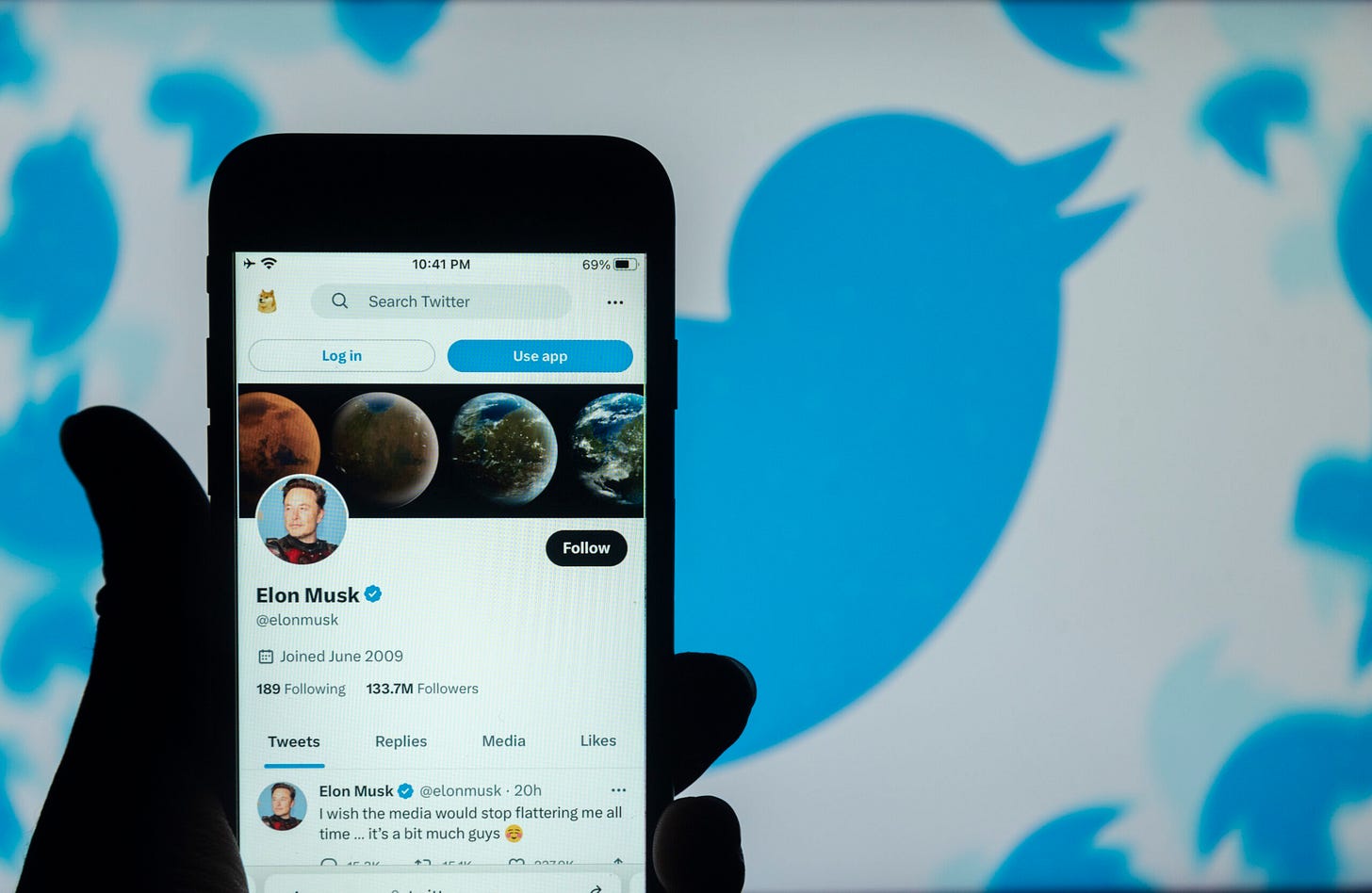So Much for ‘Elon Musk, Free Speech Warrior’
The Twitter-Substack clash has caused even some hardcore Musk supporters to jump ship.
Late last week, a bizarre new chapter opened in the saga of Elon Musk’s reign as Twitter CEO. On Friday, users of the social media platform discovered that if they sent out a tweet with a link to a Substack page, interactions with it were so severely restricted that you might as well have tweeted into a void: no likes, no retweets, no replies—you could not even reply to your own tweet. In web browsers the Twitter site would give an error message; in apps and on Tweetdeck, the attempt simply failed. Quote-tweets still worked, and some Substack-based publications with custom domains seemed to have escaped the ax; but no one knew why or whether that would change. Later, attempts to get around the throttling resulted in Twitter warnings claiming that the links to Substack were “malicious.” And attempts to use Twitter’s search function to find tweets using the term “Substack” instead brought up results just for the generic term “newsletter.”
This was no Twitter glitch: The functions were deliberately disabled after Substack announced a new feature called Notes, a service for short posts which could be a potential Twitter alternative. These actions were taken with no official announcement from Twitter or Musk. (Disclosure: The Bulwark extensively uses both Substack and Twitter.)
The sweeping measure caused consternation among Substack writers for whom promoting their work on Twitter was one of the main reasons to be on the platform. In an ironic twist, the most outspoken among them was Matt Taibbi, one of Musk’s handpicked conduits for the release of the “Twitter Files” that were billed as an exposé of supposed speech suppression by pre-Musk Twitter, much of it allegedly coordinated with government agencies (such as measures to limit the reach of tweets with COVID-related claims that public health agencies classified as misinformation). Taibbi, like the other Twitter Files authors, Bari Weiss and Michael Shellenberger, publishes on Substack. His response to the Twitter crackdown on Substack was swift:

Some other culture warriors who had backed Musk as a warrior for free speech and against the corrupt rule of progressive Big Tech and the “legacy media” also voiced dismay:


The next day, Musk finally spoke—and made claims that were promptly rebutted in Community Notes.

Substack cofounder and CEO Chris Best also weighed in.

By Sunday afternoon, the interdictions on Substack links were lifted, and tweets with such links functioned normally again—although as of this writing, Twitter searches for “Substack” still yield results for “newsletter.” No word yet on whether Taibbi still intends to leave Twitter and whether he plans to delete his account, along with all of his old tweets, or simply to stop tweeting. No word, either, on whether this particular chapter in the Twitter Wars has come to a close.
This dumpster fire of an episode is a gloriously stupid finale to the “Elon Musk, Free Speech Warrior” show that Brett Weinstein and some other Musk allies imagine is still limping along.
Musk, let’s not forget, launched his Twitter acquisition bid with an explicit agenda of saving freedom of speech on the platform from excessive and intrusive content moderation—such as banning the account of the right-wing satirical site the Babylon Bee over its refusal to delete a tweet referring to Biden administration public health official Rachel Levine, a transgender woman, as “Man of the Year.” Allegations of Twitter “censorship” via biased moderation were also at the center of the “Twitter Files.”
It wasn’t long after the Tesla founder took over Twitter that the limits of his commitment to free speech became apparent. Long before Taibbi’s revolt—just two weeks after the “Twitter Files” first dropped in December—Weiss, who also played a major role in their publication, criticized Musk for booting journalists from the platform during a spat over an account that tracked the location of his private jet. (Musk said the account was publishing “assassination coordinates” for him. In fact, the tracker showed only the origin and destination of the flights some time after takeoff and landing; what’s more, not all the suspended journalists had even linked to the tracking account, and some had merely criticized Musk or tweeted links to other social media platforms.)

Musk, with typical graciousness, responded by accusing Weiss of “virtue signaling” and sucking up to “media elites” (and falsely claiming that the suspended accounts had been “doxxing [his] real-time, exact location”).

Musk also unfollowed Weiss—which is obviously not a violation of free speech, but does say a lot about the tech tycoon’s openness to even friendly criticism.
The suspended journalists, it should be noted, were soon reinstated. But “Twitter’s Free Speech Warrior-in-Chief can have a tantrum and suspend you, but he’ll eventually relent and let you back in” is hardly a reassuring message if you really think Twitter should be a universal access public square.
Yet even after that, many people apparently thought Musk was part of a “Western-values/free-speech coalition” (according to Weinstein). Sure, if those Western values are of seventeenth-century “l’État, c’est moi” vintage. Or, in the more modern iteration offered by the late, great Nat Hentoff: “Free speech for me—but not for thee.”
The Twitter-Substack war is not the only speech restriction controversy in which the self-styled “free speech absolutist” Musk has found himself on the egregiously wrong side. There’s also the fact that Twitter has been accommodating demands by the increasingly authoritarian government of India under populist prime minister Narendra Modi to disable the accounts of opposition politicians, activists, and journalists—including some who live outside India. Add to this the recent revelation that the Twitter algorithm has been directed to downrank tweets about “the Ukraine Crisis,” which just happens to coincide with Musk’s increasingly overt antipathy to Western support for Ukraine’s defense against Russia’s war of aggression.
And that doesn’t even get into all of the other drama that has plagued Musk’s Twitter leadership: the many petty fights over the Twitter accounts of mainstream media outlets such as the New York Times and NPR; the boosting of conspiracy theories; the botched paid service plan and the utter fiasco of dismantling the old system of verification checkmarks. One could debate the reasons—personality flaws, bad management, or the toxic pull of the right-wing “anti-woke” counterculture that has turned Musk into its standard-bearer, or most likely all of the above. But the results are clear: even onetime Musk supporters are jumping ship.
Many of the critiques of pre-Musk Twitter had some validity, and at least some of the left-wing commentariat’s horrified reaction to Musk’s acquisition of Twitter even before it happened reflected an entitled view of the bird site as a space where progressive political values should dominate. But at this point, it is clear that Musk’s tenure has been a disaster. For people who are genuinely concerned about dangers to freedom of speech, it should be a lesson in the dangers of political tribalism and bad alliances.



